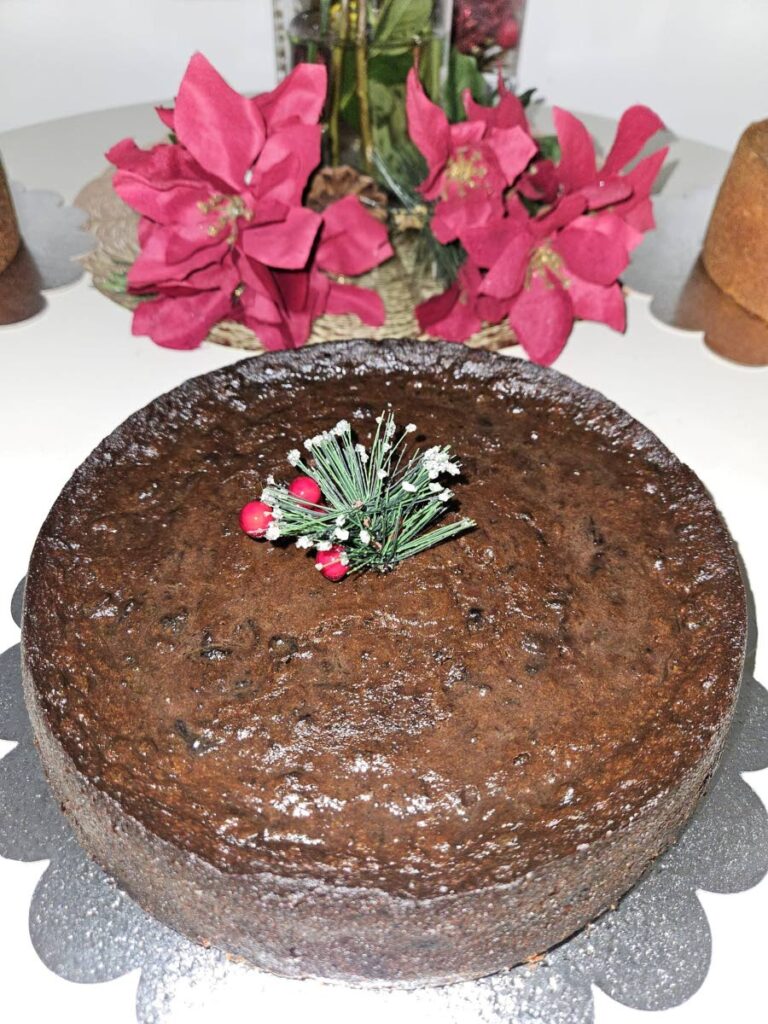For the love of black cake

BLACK CAKE has its history dating back to the colonial days when the British made their steamed pudding for Christmas, this was made with lots of fruit, steamed and served with a hard "spiked" sauce.
The enslaved Africans learnt this recipe from their masters and being inventive and clever easily adapted the recipe to suit themselves. The dark colour of the pudding was as a result of a high ratio of fruits to flour, they could not afford the large amount of fruits, so they used their method of caramelising meats in sugar, (a method we still use today for all our stews) to colour the cake black. This process was used to make browning, sugar was easily available, so browning was made and used to colour the cake black.
Fast forward to today, browning can be found for sale at all our supermarkets and readily used in savoury and sweet dishes. Those that honour the art of good black cake making will opt to make their own browning or use a higher proportion of fruits to get a delightfully rich and decadent cake. Fruits used to be soaked in port wine and rum, today the more popular alcohol is rum and cherry brandy. Non-alcoholic cakes are just as delicious with grape juice as the soaking liquid.
Black cake traditions are sacred, with many cooks soaking their fruits one year in advance. Some choose to puree their fruits, which makes a dense and surprisingly superior cake. Some bakers simple soak and mix and bake, which results in a cake that has a lot of texture, not my favourite. I prefer to use a high proportion of fruits, prunes, raisins, sultanas and currants. Each fruit contributes a flavour profile that makes for a wonderful cake. At the end of baking, you must drizzle the cake with golden rum, not cherry brandy or as I see some doing, the left over soaking liquid, too much sugar will contribute to easy spoilage.
Cakes are best enjoyed a few days after baking, if you can wait that long!
Old fashioned black cake
1 cup mixed candied peel
2½ cups raisins, chopped
2 cups currants, chopped
½ lb pitted prunes, chopped
2 cups pecans or walnuts chopped and toasted
1 cup each red and green glace cherries, halved
1½ cups dark rum (or dark rum and cherry brandy)
1¾ cups all-purpose flour
1 tsp baking powder
1 tsp cinnamon
½ tsp ground cloves
¼ tsp nutmeg
¼ tsp allspice
pinch salt
1 cup unsalted butter
1 cup brown sugar
3 eggs
2 tbs molasses
2 tsp vanilla
Brandy or rum to "nurse" your cake with after baking
Line 2 9x5-inch loaf pans or 2 nine-inch round cake tins with brown paper twice, grease the last layer and flour.
In a large bowl combine mixed peel, prunes, currants, raisins, and cherries pour on rum and let soak for a one-week or overnight, drain.
Divide fruits into two, mince one half and combine with unmixed portion.
Preheat oven to 250F.
Combine the rest of the flour with the cinnamon, nutmeg, allspice, cloves and baking powder.
With electric mixer cream butter with sugar until light and fluffy, add eggs one at a time beating well between each addition. Add vanilla and molasses.
Fold in flour mixture.
Fold in fruit mixture and nuts.
Turn batter into prepared pans and bake for 2½to 3 hours until a tester comes out clean.
Cool in tins.
Pour on brandy or rum in tablespoon increments over cakes after baking .
Repeat this for about one week.
Makes 2 cakes
rahamut@gmail.com


Comments
"For the love of black cake"